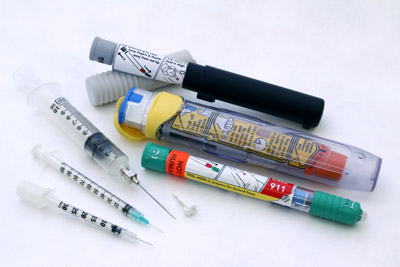Safely Using Sharps (Needles and Syringes) at Home, at Work and on Travel
- Sharps Disposal Containers
- Best Way to Get Rid of Used Needles and Other Sharps
- Sharps Disposal Containers in Health Care Facilities
- What to Do if You Can't Find a Sharps Disposal Container
- Disposal of Sharps Outside of Health Care Facilities
- Report Problems Associated with Sharps and Disposal Containers
- DOs and DON'Ts of Proper Sharps Disposal
- Free Printable Visual Learning Guides for Safe Sharps Disposal
Sharps is a medical term used for devices with sharp points or edges that can puncture or cut skin. They may be used at home, at work, and while traveling to manage the medical conditions of people or their pets. These conditions include allergies, arthritis, cancer, diabetes, hepatitis, HIV/AIDS, infertility, migraines, multiple sclerosis, osteoporosis, blood clotting disorders, and psoriasis.

Examples of sharps include:
- Needles – hollow needles used to inject drugs (medication) under the skin
- Syringes – devices used to inject medication into or withdraw fluid from the body
- Lancets, also called “fingerstick” devices – instruments with a short, two-edged blade used to get drops of blood for testing. Lancets are commonly used in the treatment of diabetes.
- Auto Injectors, including epinephrine and insulin pens – syringes pre-filled with fluid medication designed to be self-injected into the body
- Infusion sets – tubing systems with a needle used to deliver drugs to the body.
- Connection needles/sets – needles that connect to a tube used to transfer fluids in and out of the body. This is generally used for patients on home hemodialysis.
How to Dispose of Sharps
Used sharps should be immediately placed in a sharps disposal container. FDA-cleared sharps containers are generally available through pharmacies, medical supply companies, health care providers and online. These containers are made of puncture-resistant plastic with leak-resistant sides and bottom. They also have a tight fitting, puncture-resistant lid.
If an FDA-cleared container is not available a heavy-duty plastic household container, such as a laundry detergent container can be used as an alternative.
Importance of Safe Sharps Disposal
Used needles and other sharps are dangerous to people and pets if not disposed of safely because they can injure people and spread infections that cause serious health conditions. The most common infections are:
- Hepatitis B (HBV),
- Hepatitis C (HCV), and
- Human Immunodeficiency Virus (HIV).
Safe sharps disposal is important whether you are at home, at work, at school, traveling, or in other public places such as hotels, parks, and restaurants.
Never place loose needles and other sharps (those that are not placed in a sharps disposal container) in the household or public trash cans or recycling bins, and never flush them down the toilet. This puts trash and sewage workers, janitors, housekeepers, household members, and children at risk of being harmed.
Pet owners who use needles to give medicine to their pets should follow the same sharps disposal guidelines used for humans.
What to Do If You Are Accidently Stuck By a Used Needle or Other Sharp
If you are accidently stuck by another person’s used needle or other sharp:
- Wash the exposed area right away with water and soap or use a skin disinfectant (antiseptic) such as rubbing alcohol or hand sanitizer.
- Seek immediate medical attention by calling your physician or local hospital.
Follow these same instructions if you get blood or other bodily fluids in your eyes, nose, mouth, or on your skin.
Additional Resources
- Safe Needle DisposalExternal Link Disclaimer
For more information about proper disposal methods for sharps used outside of health care settings visit this website or call (800) 643-1643 - Stop Sticks Campaign – Sharps-Related Injury Prevention among Health Care Workers
Related Links
- Final Order - Reclassification of Blood Lancets
- Final Order - Effective Date of Requirement for Premarket Approval for Blood Lancets
- Proposed Order - Effective Date of Requirement for Premarket Approval for Blood Lancets
- Proposed Order - Blood Lancets; Reclassification
- FDA Flickr SlideshowExternal Link Disclaimer
- DOs and DON'Ts of Proper Sharps Disposal: Printable Version (PDF - 120KB)
- How to Get Rid of a Sharps Container: Printable Version (PDF - 136KB)